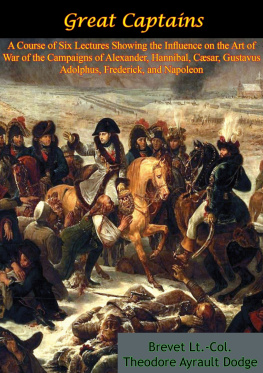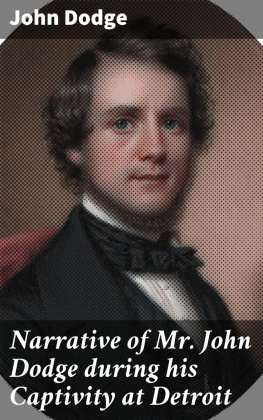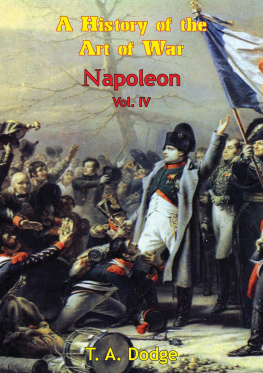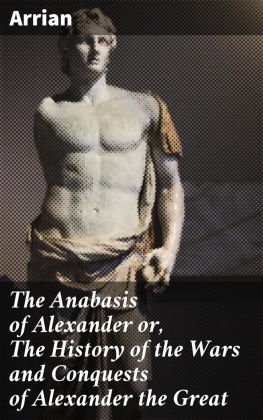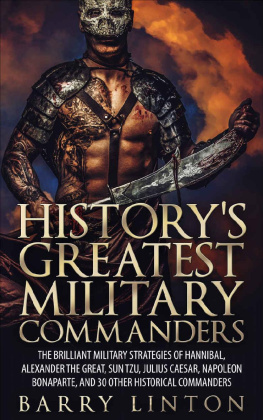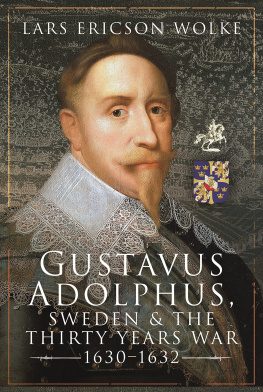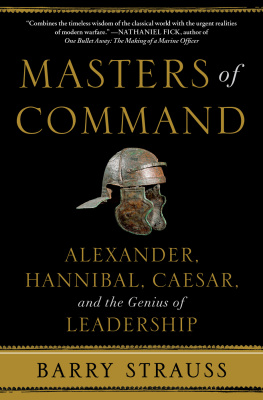

This edition is published by PICKLE PARTNERS PUBLISHINGwww.pp-publishing.com
To join our mailing list for new titles or for issues with our bookspicklepublishing@gmail.com
Or on Facebook
Text originally published in 1895 under the same title.
Pickle Partners Publishing 2016, all rights reserved. No part of this publication may be reproduced, stored in a retrieval system or transmitted by any means, electrical, mechanical or otherwise without the written permission of the copyright holder.
Publishers Note
Although in most cases we have retained the Authors original spelling and grammar to authentically reproduce the work of the Author and the original intent of such material, some additional notes and clarifications have been added for the modern readers benefit.
We have also made every effort to include all maps and illustrations of the original edition the limitations of formatting do not allow of including larger maps, we will upload as many of these maps as possible.
GREAT CAPTAINS:
A COURSE OF SIX LECTURES SHOWING THE INFLUENCE ON THE ART OF WAR OF THE CAMPAIGNS OF ALEXANDER, HANNIBAL, CSAR, GUSTAVUS ADOLPHUS, FREDERICK, AND NAPOLEON
BY
THEODORE AYRAULT DODGE
Brevet Lieutenant-Colonel United States Army, Retired List.
Author of The Campaign of Chancellorsville; A Birds-eye View of Our Civil War; Patroclus and PenelopeA Chat in the Saddle etc., etc., etc.
TABLE OF CONTENTS
Contents
BOOKS BY THE SAME AUTHOR
THE CAMPAIGN OF CHANCELLORSVILLE
It is not easy to say which part of this book is best, for it is all good. The Nation .
We do not hesitate to pronounce it one of the ablest, fairest, and most valuable books that we have ever seen. Southern Historical Papers .
A BIRDS-EYE VIEW OF OUR CIVIL WAR
It is all that could be desired; gives perhaps a clearer, more vivid view, a more accurate outline, than any other available record. London Saturday Review .
The book is written in a spirit of impartiality and of just discrimination concerning the merits and defects of the generals who led the armies of the North and South. Army and Navy Journal .
PATROCLUS AND PENELOPEA CHAT IN THE SADDLE
Colonel Dodges book is liberalizing. It may be both warmly and safely commended to all lovers of horses, and to all who ride. Atlantic Monthly .
The spirit of a sportsman pervades it throughout. The Field (London).
DEDICATION
TO
JOHN CODMAN ROPES
IN ACKNOWLEDGEMENT OF
AND IN GENUINE APPRECIATION OF HIS
ACUMEN AS A MILITARY CRITIC AND HIS FELICITY AS
AN AUTHOR
THESE PAGES ARE INSCRIBED
WITH CORDIAL ESTEEM
BY THE AUTHOR
PREFACE
THE following lectures were delivered in Boston, under the auspices of the Lowell Institute, in January, 1889. Their conciseness needs but the apology of scant time. Little can be said about Alexander or Napoleon within the limit of an hour. The sketches are of necessity meagre. They are a summary in part of a larger work, of which the author hopes soon to begin the publication, in which a volume will be devoted to each great captain, and mention made of other soldiers who have contributed to the growth of the art of war. The lectures aim to indicate briefly what we owe to the great captains, and to draw an intelligible outline of their careers, which may be filled in by reference to the extended narratives of others. Historical detail often assumes prominence in the mind to the exclusion of general form. It is the latter which it is attempted to portray.
It is generally admitted that Alexander, Hannibal, Csar, Frederick, and Napoleon belong in a class by themselves. Some may claim for Marlborough or Prince Eugene an equality with Gustavus Adolphus. But, mindful that Gustavus was the first to rescue methodical war from the oblivion of the Middle Ages, and that he originated the modern system,the art appears to owe that to him which entitles him to greater rank, though, indeed, the achievements of others may have reached or even exceeded the height of his.
All sources of information have been utilized, from Arrians Anabasis of Alexander to Jominis Life of Napoleon. Among quite recent works, special thanks are due to the exhaustive History of War of Prince Galitzin, and the Studies of Count von Wartenburg.
LIST OF MAPS
PARALLEL ORDER
THE BATTLE OF THYMBRA, B.C. 545
BEFORE THE BATTLE OF MARATHON
THE GREEK MANUVRE AT MARATHON
THE BATTLE OF LEUCTRA, B.C. 371
CONQUESTS OF ALEXANDER, B.C. 334 TO 323
THE BATTLE OF THE HYDASPES, B.C. 326
HANNIBALS FLANK MARCH, B.C. 217
THE BATTLE OF CANN, B.C. 216, I
THE BATTLE OF CANN, B.C. 216, II
CAPUA, B.C. 211
GAUL
THE CIVIL WAR
THE CAMPAIGN OF GUSTAVUS ADOLPHUS IN GERMANY, A.D. 1630-1-2
MAP FOR THE SEVEN-YEARS WAR
LEUTHEN, DEC. 5, 1757
1796
THE MARENGO CAMPAIGN
THE ULM-AUSTERLITZ CAMPAIGN
THE JENA CAMPAIGN
THE WATERLOO CAMPAIGN
LECTURE I.ALEXANDER
THE earliest history is but a record of wars. Peace had no events stirring enough to call for record. It was the conflict of heroes which inspired the oldest and still greatest of poems. As the more intelligent peoples were, as a rule, the victors, the march of civilization followed in the footsteps of war up to very recent times. The history of war has been carefully recorded for nearly twenty-five centuries, but the science of war, in a written form, dates back less than one hundred years.
The art of war owes its origin and growth to the deeds of a few great captains. Not to their brilliant victories: not to the noble courage evoked by their ambition; not to their distortion of mechanics and the sciences into new engines of slaughter; not to their far-reaching conquests; but to their intellectual conceptions. For war is as highly intellectual as astronomy. The main distinction between the one and the other lies in the fact that the intellectual conception of the general must at once be so put into play as to call for the exertion of the moral forces of his character, while the astronomers inspiration stops at a purely mental process. What has produced the great captains is the coexistence of extraordinary intellect and equal force of character, coupled with events worthy of and calling out these qualities in their highest expression.
My effort will be to suggest how, out of the campaigns and battles of the great captains, has arisen what today we call the art of war,not so much out of the technical details, which are a subordinate matter, as the general scheme; and to show that, while war is governed by its rules as well as art, it is the equipment of the individual which makes an Alexander or a Michael Angelo. Six of these captains stand distinctly in a class by themselves, far above any others. They are, in ancient days, Alexander, Hannibal, Csar,all within three hundred years of each other. Then follows a gap of seventeen centuries of unmethodical war, and we complete the list with Gustavus Adolphus, Frederick, and Napoleon,all within two centuries. The art of war is the most difficult of all arts, the military reputation in general the greatest of all reputations, says Napoleon. The limited number of great captains proves this true.
The words campaign and battle cover the same ground as strategy and tactics . Let me make these plain to you, and I shall have done with definitions and technicalities. A campaign consists in the marching of an army about the country or into foreign territory to seek the enemy or inflict damage on him. Strategy is the complement of this term, and is the art of so moving an army over a country,on the map, as it were,that when you meet the enemy yon shall have placed him in a disadvantageous position for battle or other manuvres. One or more battles may occur in a campaign. Tactics (or grand tactics, to distinguish the art from the mere details of drill) relates only to and is coextensive with the evolutions of the battlefield. Strategy comprehends your manuvres when not in the presence of the enemy; tactics, your manuvres when in contact with him. Tactics has always existed as common military knowledge, often in much perfection. Strategy is of modern creation, as an art which one may study . But all great captains have been great strategists.
Next page
